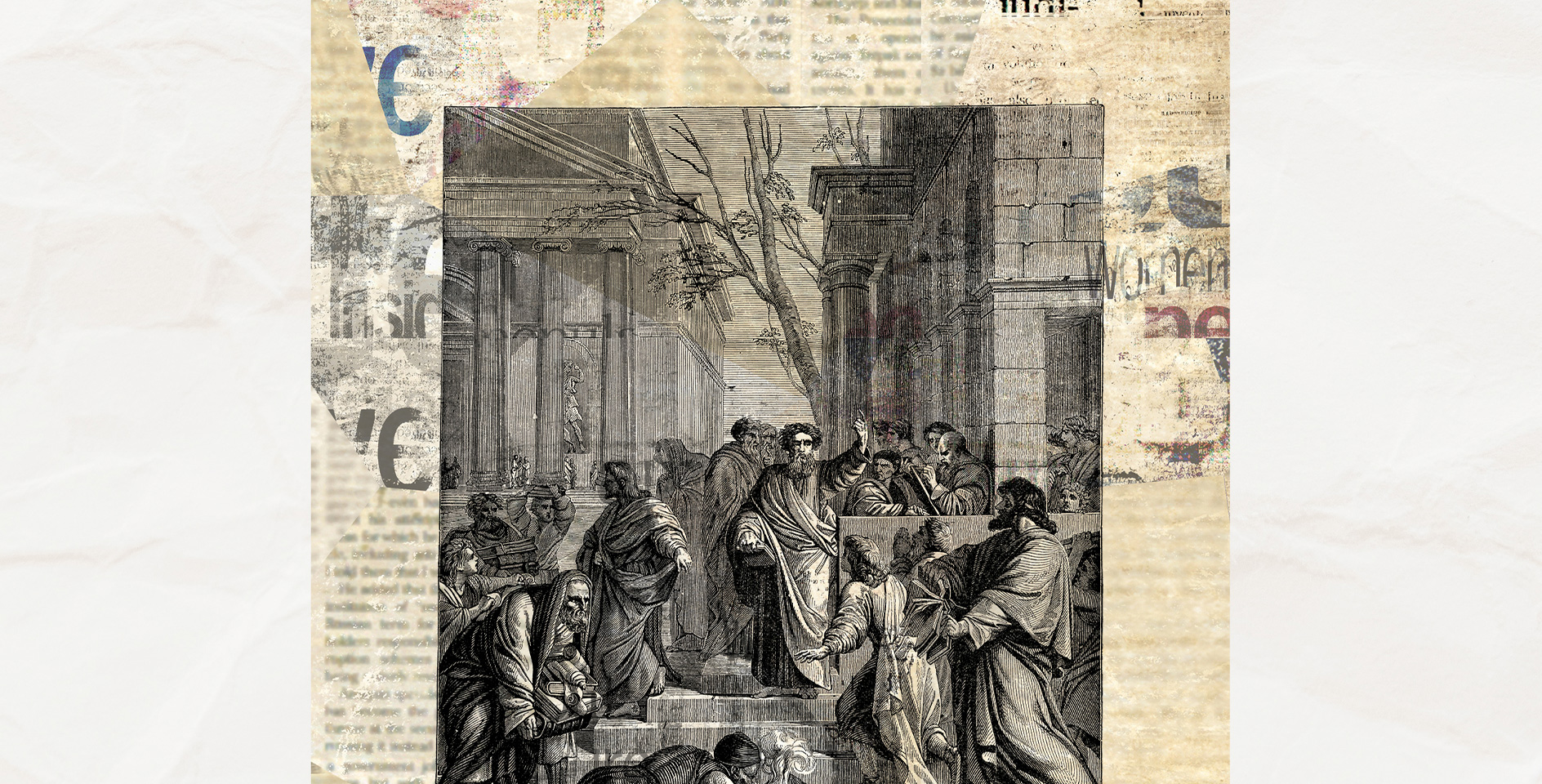What if I told you that many of the moral presuppositions—such as human rights and dignity—that our culture operates on, even those who would call themselves “secular” or “progressive,” borrow largely from a Christian worldview? If that’s the case, then the way Christians operate in our culture with non-Christians is really a matter of showing them that attempting to divorce those concepts from their foundation in the Christian faith is illogical.
Everyone is benefiting from having lived in a civilization influenced by Christianity. The question is how to help non-Christians recognize that reality. One of the easiest ways for Christians to appeal to non-Christians and to work in the public square with them is to remind them that we are the carriers of a moral tradition that grounds, explains, and secures concepts like human rights, dignity, and the very nature of truth itself.
What Christianity Offers
Let’s take something almost universally celebrated in our culture, the Declaration of Independence. Its famous words read: “We hold these truths to be self-evident, that all men are created equal, that they are endowed by their Creator with certain unalienable Rights, that among these are Life, Liberty and the pursuit of Happiness.” This famous declaration of American ideals cannot be understood apart from the Christian (and Enlightenment) worldview that birthed it.
This does not mean that America is a Christian nation or that our Founders were all born-again Christians. It does mean, however, that Christianity profoundly influenced the philosophical currents that our Founders swam in. Take just a few of its words: “Truth,” “self-evident,” “equal,” “endowed,” “Creator,” “unalienable rights,” “life,” “liberty,” and “happiness.” These deeply theological concepts do not just arise from people asserting them to be true. Rather, they must be grounded in transcendent truths if they are to be coherent.
The idea that there are self-evident truths means that everyone understands fundamental moral principles by virtue of being human (e.g., murder is wrong), a truth that is indebted to Scripture (Romans 1). The idea that humans are equal was a fantastical claim at the time—it insisted that every person deserves the same types of protections simply by virtue of their existence, drawn from a wellspring stretching back to Genesis 1. The Declaration insists these truths emanate from our Creator, and the “rights” that humans enjoy by virtue of being human are the very reason why governments are ordained—to protect and secure them so that we can flourish.
But where does the idea that humans have any value or rights worth recognizing come from in the first place? That’s where Christianity comes in. The power of Christianity is that it gave coherence to a framework of universal dignity and equality. Though not always carried out perfectly, the logic of universal dignity was found in the earliest pages of Genesis where man and woman both bear the image of God.
Further, Christianity placed limits on the power of those in authority by reminding them that they were subject to a higher power. If God is God, then Caesar is not (Matthew 22). Christianity provided the foundation to see each person as bearing inviolable rights under the rule of law.
Even when the United Nations Universal Declaration on Human Rights was drafted, it was reported that one of the members of the drafting committee left the meeting and told a reporter, “We are unanimous about these rights on the condition that no one asks why.” That’s a stunning admission. It reminds us that all human beings desire certain freedoms to live lives of integrity, meaning, and purpose.
However secular and religious, worldview systems have an immensely difficult time explaining why this moral impulse exists and why it should be protected at all costs. Christianity offers something that other belief systems cannot adequately match—an explanation. It’s easy to take that for granted, and indeed, our culture does just that.
This is not to imply that America and Christians have a perfect record on human rights. Christians, just like the world, can get things grievously wrong. We can be cowards, hypocrites, and oppressors if we’re following the culture rather than Christ. We see this in no more of a glaring example than the Declaration of Independence’s incoherence of announcing that all men are created equal even as slave owners drafting the document held fellow image-bearers in bondage.
All this reminds us of is that we can have logs in our eyes while focusing on the speck in others’ (Matt. 7:5). We need to be constantly evaluating our moral principles against Scripture, and publicly admit and repent when we find ourselves in error.
The Christian’s Path Forward
The British historian Tom Holland, himself not a Christian, was asked in a recent forum how he thought Christians should position themselves in an increasingly post-Christian and even anti-Christian culture. In his remarkable reply, he explains what an appealing path forward for Christians should embody:1https://www.youtube.com/watch?v=p6w7qw9kJ9k
Because the West has been so hegemonic for so long, it’s been in a position to assume its concept of human rights is universal. They don’t need to think about it. Of course, human rights exist. What the rise of China and other civilizational powers is doing is to remind us that the concept of human rights is one that has emerged in a specific cultural matrix, which is a Christian one. Therefore, if you want to believe in human rights, you have to believe. It takes a leap of faith to believe that there are things called human rights just as much as it takes a leap of faith to believe that the Lord Jesus Christ rose from the dead. They’re both beliefs. And the fact is that most people in the west sign up to the fact that human rights exist and they’re important and that they should determine public policy. It’s as rooted in theology and myth and metaphysics as all the teachings of Christianity. And, I think once people are reminded of that, I think [it] becomes impossible not to feel a greater sense of what Christianity is about. If you believe in human rights, why not believe that Jesus rose from the dead? Reminding people that the core beliefs that are fundamental to how people morally define themselves is rooted in faith reopens the possibility for secularists to recognize that they have not emancipated themselves from their need for faith. They continue to illustrate it and contemplating that then reopens the possibility to think well, “Where might this practice of believing in fantastical things might lead?”
Did you catch what Holland is saying? He’s saying that it’s a good and necessary apologetic for Christians to bring up their contribution to human rights doctrine, but we shouldn’t stop there. The same God who values human beings is the same God who Christians believe raised Jesus from the dead. We should not shy away from declaring both.
A non-Christian is giving Christians a playbook that says, in effect, “If you like the human rights doctrine that Christianity helped further, then just wait until you hear about Jesus Christ rising from the dead.” These aren’t unrelated realities. The same God who gives life is the same God who resurrects it.
These concepts we take for granted, like truth, rights, and human dignity, make possible one of the most basic explanations for how Christians think about our shared existence alongside non-Christians, and that’s working for and obtaining the common good of all people. The common good is the idea that civil society and civil government should strive to promote or facilitate the conditions for human flourishing. In other words, we should care about our neighbor, and the common good is the love of neighbor in the aggregate.
The common good assumes that there are natural goods to human experience that ought to be realized throughout a society. The government, whether by building safe roadways, imprisoning criminals, or prioritizing the natural family, helps to promote those characteristics of a society that promotes true human flourishing connected to moral foundations.
Christians think all these things matter because God orders the world according to common grace. All things being equal, the common good allows individuals operating within mediating institutions to cooperate toward the advancement of a just society by experiencing the excellencies that define their existence. The idea that society should have meaning, order, and purpose and that all individuals should experience it for themselves is something that Christianity helped further.
Societal institutions that benefit the whole such as hospitals, universities, and charity foundations, as well as ideas about equality and dignity such as children’s rights and women’s suffrage, all draw upon the intellectual basis of Christian principles that have animated nations and cultures. Christians only need to help the rest of the world see that those things we hold most dear are the result of the influence of Christianity in the public square. They do not need to provide a more timely apologetic, but rather a reminder about these timeless truths.










